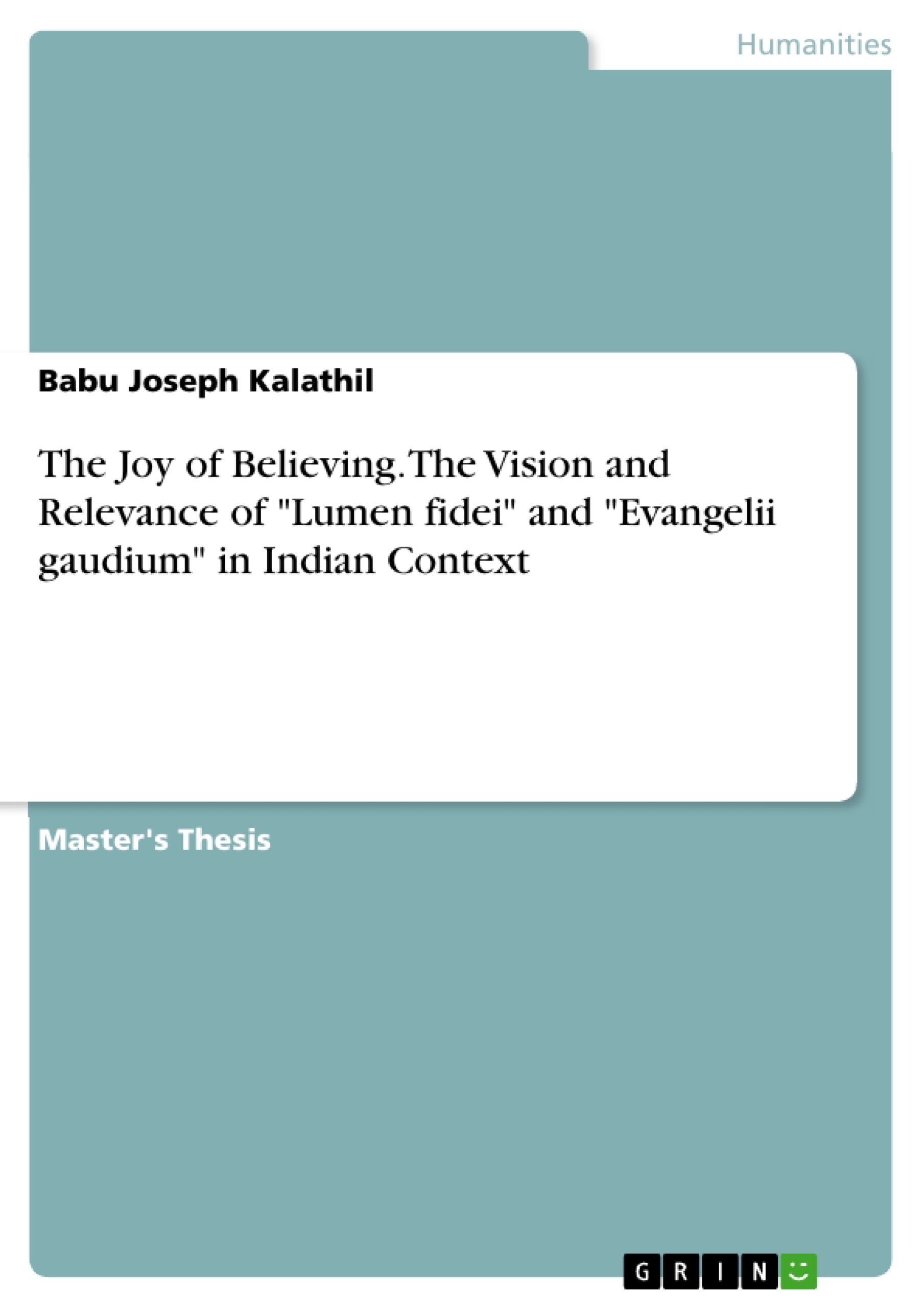In this dissertation I tried to outline the thoughts of Pope Francis expressed in his first two documents, and in that light understand the Church in India and its challenges today. I do not claim this study as complete and final. As the title of this research indicates, one can experience profound joy when one believes truthfully and practices it sincerely. The papal documents invite the faithful to experience that joy and to share it with the fellow beings. The modern and postmodern developments led the humankind to a culture of anonymity, impersonal relations, and to an inhuman orientation for profit and personal benefits ignoring the other. Utilitarian objectification of fellow humans marked this culture. Here is heard a different and varied voice, the voice of Pope Francis, which is concerned about the poor and the marginalized.
Inhaltsverzeichnis (Table of Contents)
- Dedication
- Acknowledgements
- Table of Contents
- Abbreviations
- General Introduction
- Methodology and Procedure
- Scope
- Significance of the Study
- 1.1.1 Postmodern Religion
- Limitations of the Study
- Chapter 1 Approaching Faith from the Biblical and Ecclesial Perspective
- Introduction
- 1.1 Faith and Religion - Interconnectivity
- 1.1.2. Pragmatism, Hyper-realism and Virtuality
- 1.2 Christian Understanding of Faith
- 1.2.1 Biblical Perception of Faith – OT Understanding
- 1.2.1.1 Traits of OT Faith
- 1.2.1.1.1 Covenantal Faith
- 1.2.1.1.2 The Faith as the Fear of the Lord
- 1.2.1.1.3 Faith as Relationship
- 1.2.2. NT Perception of Faith: Living Faith as Joyful Sharing
- 1.3 Joyful Sharing of Faith as Evangelization
- 1.3.1 Evangelization: II Vatican Council's Perspective
- 1.4. Evangelization as Proclamation of the Kingdom of God
- 1.4.1 Jesus and the Kingdom of God
- 1.4.2 Liberation Theology Approach
- 1.4.3 Kingdom of God -An Ecclesial Perspective
- 1.5 Joyful Sharing as Works of Charity and Justice
- 1.5.1 Charity Demands Action
- 1.5.2 Charity Demands Justice
- 1.6 New Evangelization
Zielsetzung und Themenschwerpunkte (Objectives and Key Themes)
This dissertation, "The Joy of Believing," aims to explore the vision and relevance of the papal documents Lumen fidei and Evangelii gaudium within the Indian context. The study examines the concept of faith, particularly its joyful sharing through evangelization, in light of these papal teachings. It also delves into the relationship between faith and religion, the role of the Kingdom of God, and the importance of works of charity and justice.
- The concept of faith and its joyful sharing as presented in Lumen fidei and Evangelii gaudium.
- The intersection of faith and religion in contemporary society.
- The role of the Kingdom of God in Christian faith and evangelization.
- The connection between faith and works of charity and justice.
- The application of these themes within the specific context of India.
Zusammenfassung der Kapitel (Chapter Summaries)
Chapter 1 delves into the biblical and ecclesial understanding of faith, exploring its interconnectivity with religion and its expression through joyful sharing. It examines the traits of Old Testament faith, including covenantal faith, the fear of the Lord, and faith as relationship. The chapter then shifts to the New Testament perspective, highlighting the concept of living faith as joyful sharing and its connection to evangelization. It discusses the role of the Second Vatican Council in defining evangelization and examines the proclamation of the Kingdom of God as a central aspect of evangelization, drawing insights from liberation theology. The chapter concludes by exploring the connection between joyful sharing, works of charity, and justice.
Schlüsselwörter (Keywords)
The core keywords and focus topics of this dissertation include faith, evangelization, Lumen fidei, Evangelii gaudium, religion, Kingdom of God, charity, justice, and Indian context. These terms represent the key themes and concepts explored throughout the research, highlighting the intersection of theological concepts with contemporary social realities, particularly within the context of India.
Frequently Asked Questions about "The Joy of Believing"
What is the focus of the documents "Lumen fidei" and "Evangelii gaudium"?
These documents by Pope Francis emphasize the joy of faith and the call for the faithful to share this joy through evangelization and concern for the poor and marginalized.
How is faith relevant in the modern Indian context?
The study explores how Christian faith addresses challenges like impersonal relations and utilitarianism in contemporary Indian society, focusing on charity and justice.
What is the biblical perception of faith in this study?
It examines faith as a covenantal relationship and "fear of the Lord" in the Old Testament, and as joyful sharing and proclamation of the Kingdom of God in the New Testament.
How does Liberation Theology relate to these papal teachings?
The dissertation draws insights from Liberation Theology to discuss evangelization as a proclamation of God's Kingdom that demands social justice and active charity.
What does "joyful sharing of faith" mean?
It refers to the practice of living one's belief truthfully and sharing it with others through acts of kindness, justice, and the promotion of community well-being.
- Arbeit zitieren
- Babu Joseph Kalathil (Autor:in), 2014, The Joy of Believing. The Vision and Relevance of "Lumen fidei" and "Evangelii gaudium" in Indian Context, München, GRIN Verlag, https://www.grin.com/document/285243



